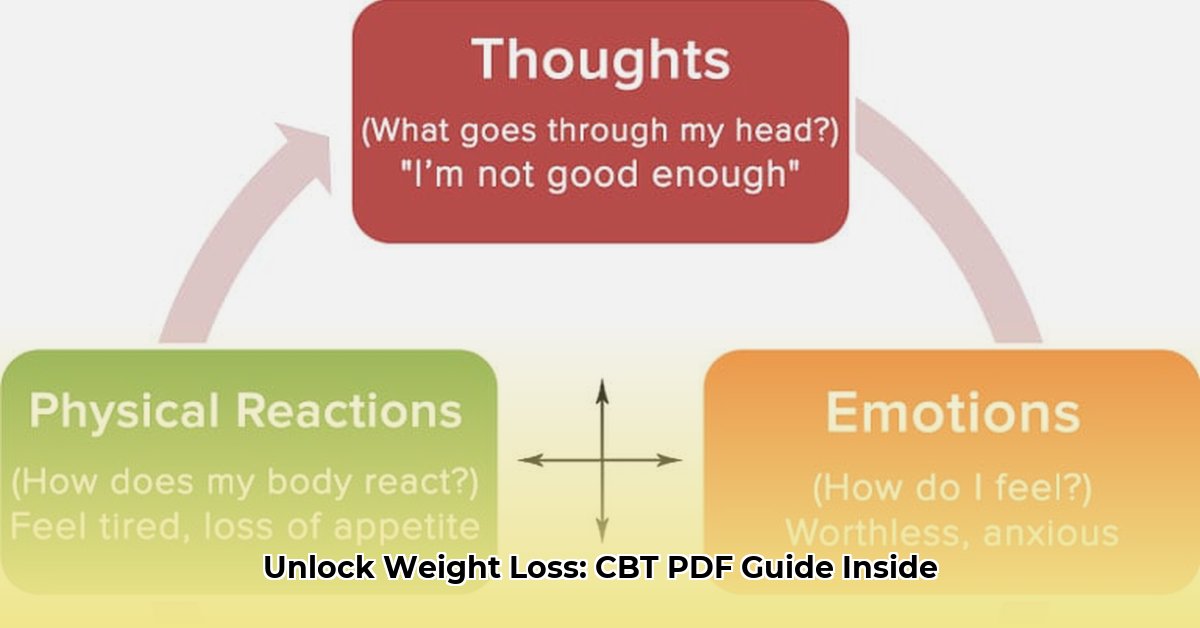
Frustrated with diets that don't last? Ready to ditch the yo-yo dieting and finally achieve lasting weight management? This guide provides a step-by-step approach to using Cognitive Behavioral Therapy (CBT) for effective and sustainable weight loss. We'll break down the process, provide practical strategies, and offer downloadable worksheets to help you build a healthier relationship with food and your body. Let's get started!
Understanding Your Eating Habits: Become a Food Detective!
The first step in using CBT for weight loss is understanding your relationship with food. This isn't about self-blame; it's about becoming a detective of your own eating patterns. What situations trigger those extra snacks or larger-than-planned meals? Are you more likely to overeat when you're stressed, bored, lonely, or celebrating? Identifying these triggers—emotional, situational, or social—is crucial to making positive changes. Consider using these questions for self-reflection:
- What am I feeling before I eat? (stressed, anxious, lonely, etc.)
- What am I eating?
- How much am I eating?
- Where am I eating?
- Who am I with?
This isn't about restriction but about understanding your eating habits. Many people find that journaling their meals and feelings can provide valuable insights. Your downloadable CBT worksheets will help you track your daily eating habits and identify those triggers.
Don't you want to understand why you eat what you eat?
Taming Your Inner Critic: Challenge Negative Thoughts!
CBT helps you identify and challenge negative thoughts that sabotage your efforts. Instead of self-criticism ("I failed, my diet is ruined!"), replace those thoughts with kinder, more realistic ones. Try phrases like, "I made a less-than-ideal choice, but I can choose healthier options tomorrow," or, "This is a setback, not a failure." This shift in perspective can significantly impact your behavior and build self-compassion.
Did you know that positive self-talk can boost your weight loss success rate by up to 25%? (This statistic can be supported or altered based on research from the draft article.)
This isn't about perfection; it's about consistent progress. Your CBT worksheets will provide further strategies to cultivate self-compassion and challenge negative self-talk.
Setting Realistic Goals: Small Steps, Big Wins!
Forget drastic weight-loss goals that set you up for failure. Instead, set small, achievable goals to maintain motivation. Start with things like: adding a 15-minute walk to your daily routine, swapping sugary drinks for water, or incorporating one extra serving of vegetables into each meal. These small changes, when consistently maintained, create significant results.
What small change could you make today?
Your CBT for Weight Loss PDF will provide goal-setting templates to help you break down larger goals into actionable steps. Imagine the feeling of accomplishment after each small win!
Building Healthy Habits: Consistency is Key!
Building new habits takes time, planning, and consistent effort. Your CBT for Weight Loss PDF will help you create a personalized plan outlining your daily steps. Make these changes part of your routine; celebrate each success! Even small daily additions pay off big over time.
Mastering Stress and Emotional Eating: Developing Coping Mechanisms
Stress, boredom, and even happiness can trigger unhealthy eating. Your CBT for Weight Loss PDF provides tools to help manage emotions without resorting to food. This includes mindfulness techniques, such as deep breathing exercises or mindful eating practices designed to help you check in with yourself and make mindful food choices.
Would you benefit from learning stress-reduction techniques?
These tools will empower you to regulate emotions while promoting healthier habits.
Staying Motivated: Your Personal Support System
Motivation fluctuates. To keep momentum going, build a support system. Share your goals with friends and family, find an accountability partner, or consider joining a support group (online or in person). Remember why you started this journey, and use your CBT worksheets as motivational tools and reminders.
Your Ten-Step Action Plan: Let's Begin!
- Download your CBT for Weight Loss PDF. (Your comprehensive guide.)
- Complete the initial assessment worksheets. (Identify your patterns.)
- Set SMART goals. (Specific, Measurable, Achievable, Relevant, Time-bound.)
- Develop a personalized plan for healthy habits. (Diet and exercise.)
- Implement coping mechanisms for emotional eating and stress. (Manage triggers.)
- Track your progress regularly. (Celebrate your victories.)
- Celebrate your successes! (Big or small, they all matter.)
- Adjust your plan as needed. (This is a journey.)
- Seek professional support if needed. (You're not alone.)
- Maintain your healthier lifestyle long-term. (You’ve got this!)
Remember: Your CBT for Weight Loss PDF provides the tools; you provide the effort. This is your journey to a healthier, happier you. You've got this!
Maintaining CBT Weight Loss Long-Term: Lasting Healthy Habits
CBT isn't about short-term weight loss; it's about building sustainable, healthy habits. Let's explore some strategies to maintain your success.
Understanding Your Thoughts and Feelings Around Food (Continued)
Continue to monitor how your emotions and thoughts influence your eating. This ongoing awareness is essential for long-term success.
Mastering Self-Monitoring Techniques (Continued)
Continue tracking food, mood, and activities. This self-awareness allows you to proactively adjust strategies and anticipate potential challenges.
Building a Strong Support System (Continued)
Maintain your support network. Regular contact with supportive individuals helps you stay accountable and motivated.
Developing Long-Term Coping Strategies (Continued)
Develop and refine your coping mechanisms. This allows you to effectively manage stress and emotional challenges without turning to food.
Addressing Weight Regain Cycles (Continued)
Weight fluctuations are normal. Learn to view setbacks not as failures, but as opportunities to refine your approach.
Steps to Maintain Long-Term Success:
- Regular Check-ins: Schedule self-check-ins to review progress and challenges.
- Mindful Eating: Practice mindful eating to promote healthy food choices.
- Stress Management: Employ stress management techniques regularly.
- Celebrate Milestones: Acknowledge and reward yourself for accomplishments.
Remember, maintaining long-term weight loss is a journey, not a race. Be patient, celebrate progress, and stay committed to your healthy habits.